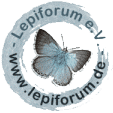

 +1Kontinente:EU
+1Kontinente:EU2. Diagnose
2.1. Männchen
2.2. Weibchen
2.3. Erstbeschreibung
3. Weitere Informationen
3.1. Andere Kombinationen
- Bryophila canaria Alphéraky, 1889 [Originalkombination]
3.2. Verbreitung
Kanarenendemit. Fibiger et al. (2009) warnten: "There is an ongoing revision of the populations from the Macaronesian Islands. The study of material from the Canary Islands resulted in the recognition of two distinct species on almost every island, which differ in small but consistent structures of the genitalia. However, considering the many different species groups of the Palaearctic Bryophilinae, it is perhaps necessary to be more confident before a decision is made publish all the taxa at species level. On the other hand, if these entirely allopatric populations are described as subspecies, it will appear inconsistent with the knowledge of the differences recognised in the subfamily.The unpublished studies by Boursin and those still unpublished by Fibiger, listed with some in litteris species-names in the 'Fauna of Europe' project (for Noctuidae: Fibiger & Skule), will be published in due course."
2013 ging es endlich weiter: Nach momentaner Kenntnis (Behounek & Speidel 2013) ist die Art auf die Kanareninseln Teneriffa und Palma beschränkt, wo sie gemeinsam mit Nyctobrya simonyi (ssp. simonyi) fliegt.
3.3. Literatur
- Erstbeschreibung: Alphéraky, S. (1889): Zur Lepidopteren-Fauna von Teneriffa (Mit einem Vorwort von Dr. G. Sievers). — Mémoires sur les Lépidoptères 5: 203-232, pl. XI. St.-Pétersbourg (M. M. Stassuléwitsch).
- Behounek, G. & W. Speidel (2013): Contribution to the knowledge of the genus Nyctobrya Boursin, 1957 (Lepidoptera: Noctuidae: Bryophilinae) in the Macaronesian archipelago, with description of a new species from Gran Canaria. — Zeitschrift der Arbeitsgemeinschaft Österreichischer Entomologen 65: 157-166.















